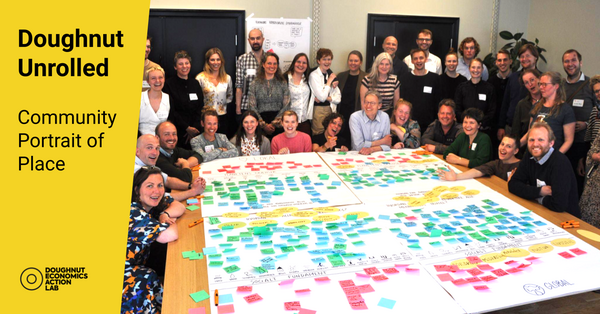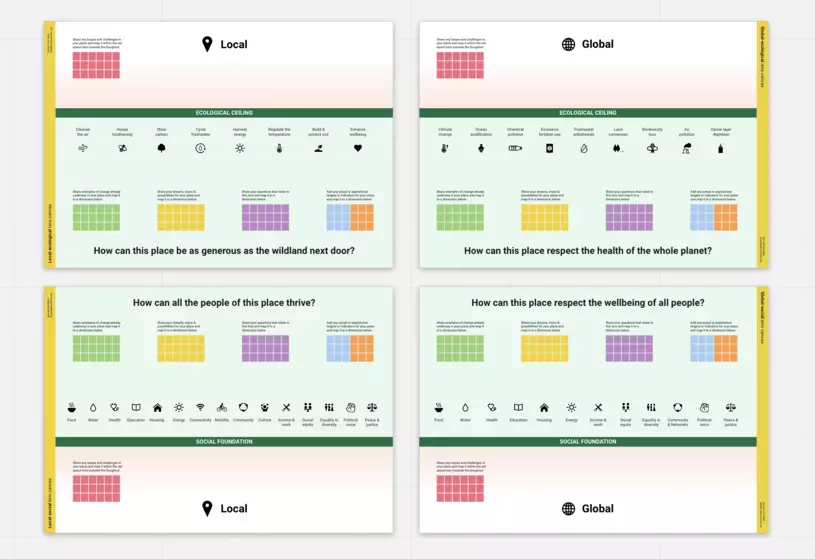
Doughnut Unrolled: Community Portrait of Place
A selection of participatory workshop approaches you can use to explore the four lenses for your place

Version 1.0 (April 2022)
📢 Now translated into French, Spanish, German and Brazilian Portuguese
Overview
The goal of the Doughnut is to meet the needs of all people within the means of the living planet, but what does this mean for the neighbourhoods, cities, districts or nations where we live?
To help you explore this question we've created Doughnut Unrolled, a concept that takes us from the Doughnut to four 'lenses' that invite you to look at the interplay between local aspirations and global responsibilities in your place – both socially and ecologically – and identify possible entry-points for transformative action.
.png)
This tool - Community Portrait of Place - is selection of participatory workshop approaches you can use to explore the four lenses for your place, to create a holistic picture or a 'portrait' of your place's local aspirations and global responsibilities, both socially and ecologically.
- Open the tool in the following languages here:
- Open the Miro canvases in the following languages here:
- All pdf canvases available here
The workshops can be run in-person and online. For the online setting, we've created this set of canvases in Miro (password: fourlenses) that is designed for you to copy, or 'duplicate' into your own Miro account. If you don't have a Miro account, you can create one for free, very easily - that will give you space for three boards. 
Community Portrait of Place is one of five Doughnut Unrolled tools that work together to apply the ideas of Doughnut Economics to your place:
- Introducing the four lenses
- Community Portrait of Place (this tool)
- Data Portrait of Place
- Exploring a topic
- Dimensions of the four lenses
Together they help you create a 'Doughnut Portrait' of your place - a holistic picture with diverse inputs and perspectives - that can act as a starting point for transformative action.
.png)
Whilst we are launching these tools in English we are also kicking off a process for translating all 5 tools into some languages and we will share more details of this in the following weeks.
Why use it?
Community Portrait of Place enables you to build up a holistic perspective of all the qualitative aspects of what it means for your place to thrive and to help bring humanity into the Doughnut.
It invites the people of your place to share their knowledge, ideas, experience and aspirations, to build a rich picture, or 'portrait' of your place, that can keep evolving as more voices contribute, and as knowledge, ideas, experience and aspirations changes over time.
It beautifully complements the Data Portrait of Place approach, that invites you to build up a holistic picture of the quantifiable aspects of what it means for your place to thrive and to help bring humanity into the Doughnut.
So we invite you to explore both these approaches - Data Portrait of Place and Community Portrait of Place - to build a rich and holistic portrait of your place, that draws upon both data and the many and various contributions from the people of your place.
Who is it for?
This tool is for anyone who wishes to explore what the ideas of Doughnut Economics means for them in their place.
Important note: If you wish to use these tools as part of your consultancy or professional advisory services for others, then we require that you follow DEAL's policy for consultancies and professional advisors.
How long does it take?
You can do a quick taster workshop that takes 90 minutes. You can do a half-day or full-day workshop. You can also build up your portrait over time through different methods and with different audiences.
There's a role for all of these approaches, and you might like to start with a quick taster workshop, or a half-day workshop, then think about how you might begin to plan a longer process of building up your portrait over time.
How many people is it for?
For any one workshop, you'll need to think about how many people can meaningfully contribute. This will be dependent on the size of space you have, the number of facilitators you have, and how people will be invited to share their contributions; e.g. if you map all contributions to one large four-lenses canvas, then you will need to keep the number below or around 40, but if everyone is working in smaller groups with their own canvas, then numbers can be larger.
What materials do you need?
You'll need to prepare a canvas, either printed or created in-person, or via Miro if online.
You'll need ways for people to contribute their ideas to the canvas, such as sticky-notes or similar.
What does the facilitator need to know or be able to do?
The facilitator needs to understand the concept of the four lenses, so we recommend you read Introducing the four lenses first.
The facilitator also needs to design the flow of the workshop according to the needs of the group and the intentions you have for the workshop, e.g. to introduce how holistic thinking can be beneficial to connect things and see new opportunities.
In the tool we give some example workshop structures, but there are so many variations that we focused on showing some of the approaches you can take to use in your own workshop design.
Acknowledgements
This tool was created by Rob Shorter, Leonora Grcheva, Kate Raworth and Andrew Fanning of the DEAL Team, in collaboration with Ruurd Priester.
The four lenses builds upon the methodology of Creating City Portraits co-created with Biomimicry 3.8, Circle Economy, and C40 Cities; and the workshop approaches build upon those developed by Civic Square.
We would like to thank the DEAL Community members who reviewed and tested this tool and offered feedback that helped in its development, including Mat Siffels of Amsterdam Donut Coalition, Ilektra Kouloumpi of Circle Economy, Jonas Boothe of Next Economy Lab (NELA) and Roisin Markham of Irish Doughnut Economics Network (IDEN). For anyone we’ve missed, thank you, and do let us know so we can acknowledge your contribution here.
We would also like to thank Iconmonster for the icons used.
Links
- Open the tool in the following languages here:
- Open the Miro canvases in the following languages here:
- All pdf canvases available here
Feedback
Healthy living systems rely on good feedback loops and we invite your comments, reflections and suggestion from using this tool to help us iterate and evolve for future versions.
You can do this two ways:
- The first is to leave a comment in the section below called Join the conversation. The benefit of this approach is that everyone can see and benefit from what you share.
- The second way is to contact the DEAL Team directly via the contact form and choosing the category 'Tools and Stories'.
Share
Share
-
Story

Doughnut Economics in planning and architecture
Webinar recording: Doughnut Economics in urban development and architecture - two case studies from Norway and the UK.
-
Story

Neighbourhood Doughnut Portrait Launch
We're excited to introduce you to the first Neighbourhood Doughnut Portrait, painted by many people together in Ladywood
-
Story

Launching our Data Portrait as an exhibition
A platform for lots of conversations with people and expanding our network in Minato Ward.
-
Story
Community Portrait of Glasgow
Bringing the Doughnut to ‘ARCadia’ - the community launch of University of Glasgow’s Advanced Research Centre
-
Story
.png)
Applying Doughnut Economics to businesses
Exploring how businesses and community organisations can support the economy of the future.
-
Story

Transforming places with the Doughnut - webinar 2
Watch the recording of two local governments working with Doughnut Economics in Brussels, Belgium and Nanaimo, Canada
-
Story

Transforming places with DE - webinar 1
Hearing from community-led initiatives in Leeds, UK and Melbourne, Australia
-
Member

Jannis Niethammer
Freiburg im Breisgau, Baden-Württemberg, Deutschland
Student in Environmental Governance
-
Member

Neil Donaldson
Kintyre, Argyll and Bute, Scotland
I am an environmental consultant and member of Kintyre Community Resilience Group
-
Member

Jane Whild
Milton Keynes, England, United Kingdom
I am and ex University Administrator, now spending my time on activism in local communities in Milton Keynes to tackle the Climate Crisis, Misogyny and Gender Inequality. I am a core member of the MK Doughnut Economics Group which operates under the umbrella of Transition Town MK. Our group are part of a fledgling Milton Keynes Climate Action Network (MKCAN). I am a member of the Women's Equality Party (WEPUK) - the first political party to adopt Doughnut Economics as policy. I am also a member of FawcettMK, Citizens:mk and Cycling Citizens MK. I would like to see the Doughnut applied to my Borough and am a member of Milton Keynes DECA (Doughnut Economics Climate Action) Group.
-
Member


Francesca Milocco
Amsterdam (The Netherlands) & Udine (Italy)
I am Italian, living in the Netherlands. My ambition is to contribute to develop a truly sustainable society by connecting people and projects within an international and interdisciplinary context. My background is in chemistry (master in Chemistry at the University of Trieste (IT), PhD in Chemistry and Postdoc in Chemical Engineering at the University of Groningen (NL) and next to my work as R&D Project Manager I like to engage myself in volunteering activities where I can use both my scientific background as well as my social skills in projects focused on sustainability. Therefore, with a group of people from the italian region Friuli Venezia Giulia, we recently founded a non-profit organisation "ReGeneration Hub Friuli" with the aim of connecting people who want to become the Generation of ReThinking, ReDesigning, ReCycling, ReDistributing, ReGenerating. In this context, we organise a yearly annual festival “NanoValbruna” (www.nanovalbruna.com), which brings together scientists, entrepreneurs, teachers, professionals and young people in a small mountain community of the Julian Alps, where they engage themselves in activities focused on ecosystem protection, sustainability, and circular economy.
-
Member

Nichole Schantz
The University of Bath
-
Member

.jpg)
John Adams
Salt Lake City, Utah, United States of America
I retired early from my career in technology sales. The culture of corporate America was no longer working for me. Specifically the idea that there is a moral space, where as long as you are not breaking the law, your only responsibility was to shareholder value and pursuit of profit. Full acceptance of this leaves little space to connect with your values and principles. As I dug deeper into the concepts of Doughnut Economics the decision to retire from my professional job was a no-brainer. It was a purposeful transition from years of accumulating, to focusing on how to thrive so that I could live the concepts. This in turn has freed up my time and attention capacity to make sense of the current situation of the world, understand the underlying systems, and determine how I can contribute to help make positive change. I came to DEAL to find guidance on how to take action.
-
Member


Brian Dowling
Hacienda Heights, California, United States of America
I serve as Treasurer for the California Doughnut Economics Coalition (CalDEC.org).
-
Member


Phillippa Banister
Shipley, England, United Kingdom
Founder of Street Space, a social enterprise working with people to reimagine their streets and spaces to make them feel safer, bring joy and social connection.
